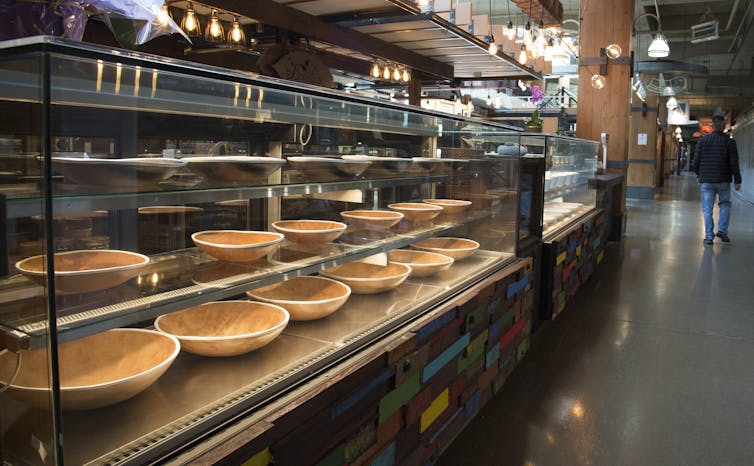

Sylvain Charlebois, Dalhousie University
These are unprecedented times. As we deal with the current coronavirus pandemic, we find our regular routines and habits altered and disrupted. Not-so-graceful displays of panic buying have been seen almost everywhere. People have been impulsively emptying shelves, irrationally.
Quarantines, cancellations, closures and social distancing are keeping people at home to slow the spread of the disease. One positive thing coming out of this unfortunate situation could be that people will spend more time in their kitchens, a place where fewer Canadians have ventured in recent years.
The evidence suggesting that Canadians are spending less time in the kitchen is mounting. According to Statistics Canada, 54 per cent of Canadians eat out once a week or more; 40 per cent say they eat out for convenience, have no time to cook or do not like or know how to cook.
Cooking is a fantasy for many
The average Canadian can now watch over 250 hours of cooking or food related shows a week on television. A few networks are solely devoted to food. Still, cooking is just a fantasy for a growing number of Canadians.
Time has been unkind to kitchens. In a survey we conducted at the Agri-Food Analytics Lab at Dalhousie University, 95 per cent of people born before 1946 indicated they ate meals prepared by parents or a caregiver at home when growing up. That percentage dropped significantly over the generations.

Millennials were not exposed to home-cooked meals as much, and neither was generation Z. About 64 per cent of millennials regularly ate home-cooked meals when growing up, compared to 55 per cent for gen Z. This suggests younger generations have a different appreciation for the kitchen and how food is prepared and consumed at home. The COVID-19 pandemic could potentially make younger generations more familiar with a space which seems foreign to them.
More time at home could be a benefit for all of us. In that same survey conducted by Dalhousie University, 68.4 per cent said they would like to spend more time preparing food at home. With the current public safety measures, many will be getting their wish.
Let’s get cookbooks off the coffee table
Reading a cookbook is like watching a good movie. We can project ourselves into the story, imagine we can do things we never thought possible, making us dream. Some cookbooks these days are works of art. But many cookbooks are used as coffee table books. COVID-19 could change that.
As we are forced to spend more time at home, and with provisions safely nestled in cupboards and freezers, the opportunity to revisit our kitchens daily has never been so good. Equipped with unread cookbooks and underused kitchen tools, Canadians now have time to take action in the kitchen. Cooking could also be an activity that brings family members and roommates together; cooking and eating together can be a wonderful bonding experience.
We will get through this by listening to our competent public health officials and staying home. In the meantime, let’s dust off our cookbooks and get reacquainted with the one room that can truly be considered the heart of anyone’s home: the kitchen.
Sylvain Charlebois, Director, Agri-Food Analytics Lab, Professor in Food Distribution and Policy, Dalhousie University
This article is republished from The Conversation under a Creative Commons license. Read the original article.


